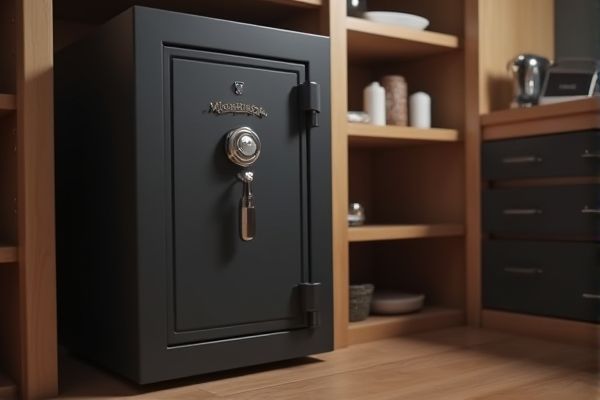
A closet safe offers discreet, larger storage integrated into your furniture for valuables and important documents, while a lockbox provides portable, compact security ideal for quick access and transport. Explore the rest of the article to discover which option best fits your security needs and lifestyle.
Table of Comparison
| Feature | Closet Safe | Lockbox |
|---|---|---|
| Size | Large; fits clothes and valuables | Small; portable storage |
| Installation | Built-in or recessed in closet | No installation; standalone |
| Security Level | High; heavy steel, bolted | Moderate; portable locks |
| Portability | Fixed; not portable | Portable; easy to carry |
| Use Case | Long-term secure storage | Temporary or travel storage |
| Cost | Higher; due to size and installation | Lower; compact and simple |
Closet Safe vs Lockbox: Key Differences
Closet safes offer larger storage capacities and can be securely anchored within closet walls for enhanced protection against theft and fire. Lockboxes are typically smaller, portable, and designed for quick access to valuables like documents or small electronics but may lack advanced fire resistance and mounting options. Choosing between a closet safe and a lockbox depends on the level of security, storage size, and accessibility required for your valuables.
Security Features Comparison
Closet safes provide advanced security features such as reinforced steel construction, tamper-resistant locking mechanisms, and often incorporate biometric or combination locks for enhanced protection. Lockboxes typically offer portability with solid metal bodies and key or combination locks but may lack the heavy-duty resistance to prying and drilling found in closet safes. For maximum security against break-ins and unauthorized access, closet safes provide a more robust defense compared to standard lockboxes.
Accessibility and Convenience
A closet safe offers discreet storage that blends seamlessly into your home, providing quick access while maintaining security for your valuables. Lockboxes, often portable and compact, prioritize convenience for on-the-go protection but may sacrifice some ease of accessibility compared to built-in closet safes. Depending on your need for rapid retrieval or mobility, choosing the right option ensures your valuables are both secure and readily accessible.
Installation Requirements
Closet safes typically require secure mounting to wall studs or the floor, ensuring enhanced theft protection but demanding more effort and professional tools for proper installation. Lockboxes offer a more portable and flexible solution with minimal installation, often only needing to be attached with screws or placed in a discreet location without permanent fixtures. Choosing between the two hinges on balancing the need for robust security against the convenience of quick, low-effort installation.
Space and Storage Capacity
Closet safes typically offer larger storage capacities and more flexible space configurations compared to lockboxes, making them ideal for securing bulky items, important documents, and valuables. Lockboxes are more compact and portable, providing limited space primarily for smaller valuables, which is perfect for your on-the-go security needs. Choosing between the two depends on how much storage space you require and where you plan to keep your valuables securely.
Cost Analysis: Closet Safe vs Lockbox
Closet safes generally come with higher upfront costs due to their reinforced steel construction, larger size, and added features like fireproofing, typically ranging from $200 to $1,000, whereas lockboxes are more budget-friendly, often priced between $30 and $200. Maintenance and installation expenses for closet safes can increase total ownership costs, involving professional mounting and potential wall modifications, while lockboxes usually require minimal setup and no additional labor costs. Evaluating the cost-to-security ratio reveals closet safes offer enhanced protection and storage capacity at a premium price, making lockboxes ideal for cost-conscious users seeking basic security for smaller valuables.
Portability Considerations
Closet safes typically offer limited portability due to their larger size and heavier construction, making them more suitable for stationary use in a fixed location. Lockboxes are compact and lightweight, designed for easy transport and quick access, ideal for securing valuables while on the move. Your choice depends on whether you prioritize mobility and convenience or a more permanent, secure storage solution.
Best Uses for Each Option
Closet safes excel in providing concealed storage for valuables, important documents, and firearms within bedroom closets, offering discreet security that blends seamlessly with home decor. Lockboxes are ideal for portable, short-term protection of cash, passports, and small electronics during travel or temporary use, featuring compact designs and reinforced locking mechanisms. Choosing between a closet safe and a lockbox depends on the need for fixed, hidden security versus portability and convenience in safeguarding personal items.
Durability and Material Quality
Closet safes typically offer superior durability with heavy-duty steel construction and advanced locking mechanisms designed to withstand forced entry attempts and resist tampering. Lockboxes, often made from lighter metals or reinforced plastic, provide moderate protection suitable for smaller valuables but may not endure intense physical attacks as effectively as closet safes. Choosing a closet safe ensures higher material quality and long-term security for important documents and valuables.
Choosing the Right Option for Your Needs
Closet safes offer sturdy, concealed storage integrated into your wardrobe, ideal for protecting larger valuables and important documents. Lockboxes provide portable, compact security solutions, perfect for immediate access and easy transport of smaller items like passports, cash, or firearms. Selecting the right option depends on your need for size, portability, and level of concealment necessary to safeguard your belongings effectively.
 homyna.com
homyna.com